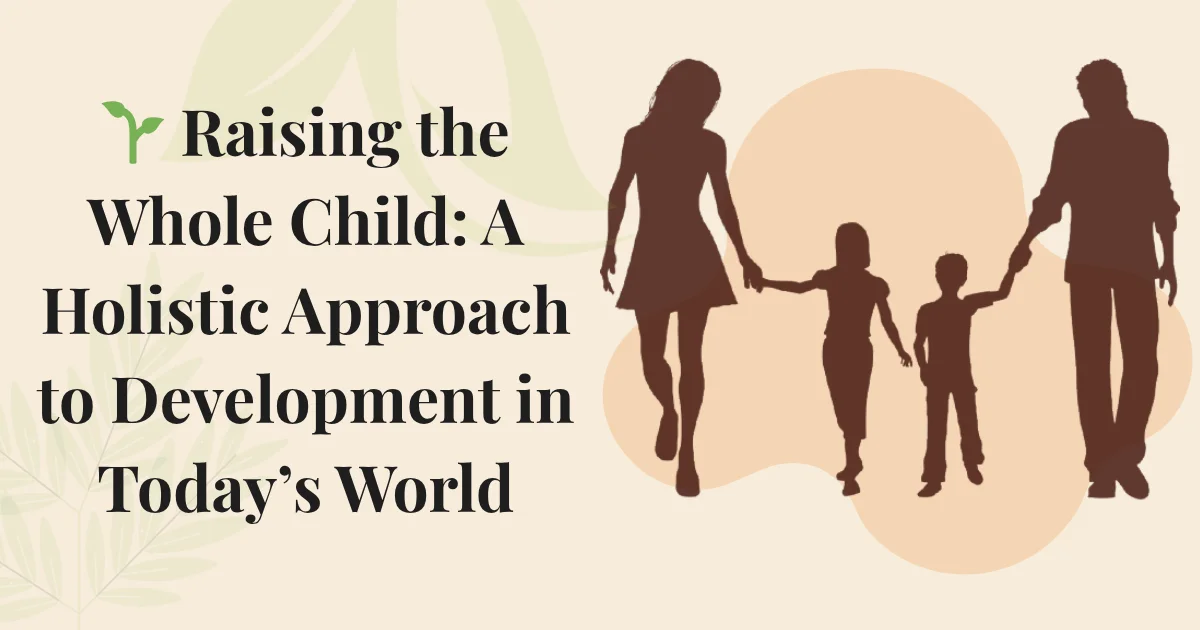
“A child’s mind, body, and heart grow best when nurtured together — not separately.”
✨ Introduction:
Modern parenting often feels like juggling: academic performance, emotional health, physical activity, digital habits, and social life — all at once. But what if we could stop juggling and start integrating?
That’s the heart of Holistic Child Development — an approach that doesn’t separate mental growth from emotional needs, or academic success from physical wellness.
It’s not about doing more. It’s about doing what matters — together.
🌿 What is Holistic Child Development?
Holistic child development views your child not just as a student, athlete, or emotional being — but as a whole human.
It recognizes that:
- Emotional regulation affects learning
- Nutrition and sleep shape mood and attention
- Play and connection are as vital as discipline and structure
This philosophy encourages parents to nurture the mind, body, and heart in harmony, helping children thrive — not just survive.
🔍 The 3 Pillars of Holistic Growth
1. Mental Growth: Building Curiosity and Focus
Mental development isn’t only about academics — it includes:
- Creative thinking
- Self-directed learning
- Focus and mindfulness
- Critical thinking skills
Support your child’s mental growth by:
- Asking open-ended questions
- Encouraging exploration and wonder
- Offering quiet, device-free time for reflection
💡 “How do you think that works?” is more powerful than “What’s the right answer?”
2. Emotional Growth: Teaching Resilience & Empathy
Children aren’t born knowing how to handle big feelings — they learn through:
- Co-regulation with adults
- Safe space to express
- Opportunities to repair after conflict
Build emotional strength by:
- Naming feelings together (“You’re feeling disappointed because…”)
- Practicing calm-down strategies (breathing, movement)
- Teaching empathy through modeling and books
🌈 Children learn “I am loved even when I struggle.”
3. Physical Growth: Movement, Rest, Nutrition
When we ignore the body, emotional and mental health suffer.
Balance your child’s day with:
- Daily outdoor play
- Body-awareness through yoga or dance
- Nutritious food that supports energy and focus
- Adequate, consistent sleep
Even simple walks or stretching can improve learning and mood regulation.
🔄 Everything is Connected
A child who didn’t sleep well may be short-tempered. A child who feels unheard may struggle to concentrate. A child who eats highly processed food might experience emotional dysregulation.
🌀 The body, mind, and heart form a circle — and each affects the other.
💬 Real-Life Scenario: Homework Meltdown
Your child is crying over math homework.
The surface issue? Struggling with the assignment.
The deeper layers?
- Emotional frustration (fear of failure)
- Physical tiredness (late night, hungry)
- Mental burnout (overloaded from the day)
Holistic child development steps in with compassion:
- Connect first (“You seem really overwhelmed — want a break?”)
- Check physical needs (Snack? Rest?)
- Regulate emotions together (Breathe, hug)
- Problem-solve when calm (“What part feels hard? Let’s try it together.”)
✨ Holistic Child Development in Simple Practices
- 🍽️ Eat one mindful meal together daily — no devices
- 📚 Read a book that sparks emotional conversations
- 🚶♀️Take a family walk to decompress after school
- ✍️ Use a journal for emotions or gratitude
- 🛏️ Build a calm, screen-free bedtime rhythm
You don’t need to do everything. Just one small step a day creates lasting impact.
📘 Want a Complete Roadmap?
Our eBook “Holistic Child Development: Combining Physical, Emotional, and Mental Growth” guides you through a gentle, practical approach to raising whole children.
What’s inside:
✅ Section-wise guidance on body, mind, and heart
✅ Case studies and journal prompts
✅ Actionable checklists and routines
✅ Holistic toolkit pages to support your home
💬 “It helped me zoom out and stop parenting in parts — now I see my child more clearly, more completely.”
🌸 Final Thought
Children don’t need perfection. They need presence.
They don’t need to do more — they need us to see more.
Holistic child development is not a task list.
It’s a way of being — slow, tuned in, and whole-hearted.


